Managing Morning Sickness: What To Eat After Vomiting During Pregnancy

Nourishing Your Body: What To Eat After Vomiting During Pregnancy
Experiencing nausea and vomiting during pregnancy is, unfortunately, more common for many expectant moms than we’d all like it be. Getting into the numbers, about 65% of pregnant women experience morning sickness while pregnant 🤢. It often starts at about 4-8 weeks of pregnancy and continues to 12 -16 weeks (or more for some). The delicate balance of hormones, coupled with the physical changes happening in your body, can make mealtime feel like a daunting task. But don’t worry, momma! In this blog, we will explore a variety of refreshing drinks and nourishing foods that can help ease your discomfort and provide essential nutrients for you and your growing baby. So grab a cozy seat, take a deep breath, and prepare to list foods that fight nausea during pregnancy. 🤰
Rehydration is Key
After experiencing vomiting or even prolonged bouts of nausea, one crucial step is to rehydrate your body. Aiming for 6-8 glasses of water per day is recommended, but it's important to remember that when you vomit, you not only lose fluids but also essential electrolytes like sodium and potassium. These electrolytes are vital for maintaining proper hydration levels in your body. Replenishing them can help restore balance while relieving dehydration symptoms such as dizziness or fatigue. The best options you can consider to help you rehydrate include the following:
1. Clear Broth or Soup
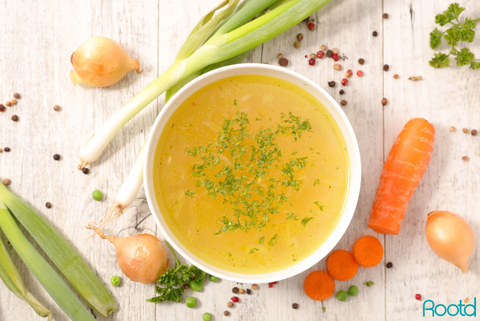
One way to rehydrate while soothing your stomach is by sipping clear broth or soup. Opt for options like chicken broth or vegetable soup that are light on spices and easy to digest. The warm liquid will not only provide much-needed hydration but also offer some nourishment.
2. Coconut Water

Coconut water is a natural source of electrolytes such as potassium and magnesium. Its mild flavor makes it an excellent choice for rehydration after vomiting during pregnancy. Remember to choose unsweetened coconut water without any added sugars.
3. Homemade Electrolyte Drinks
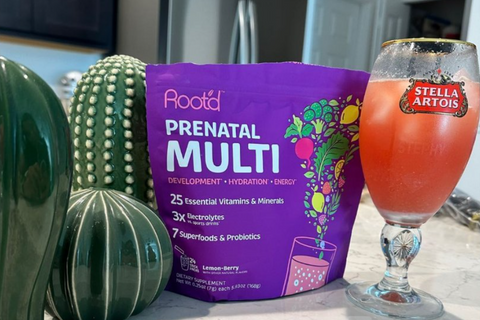
If you prefer a DIY approach, consider making your own electrolyte drink at home. Combine water, a squeeze of fresh lemon or lime juice, a pinch of salt, and a touch of honey for natural sweetness. Our Root'd mommas also love mixing a packet of prenatal multi for an extra boost of essential nutrients that your body craves for. This homemade electrolyte solution can help replenish lost fluids and nutrients.
Want more recipes to try? Check out our roottail guide here!
Nourishing Foods that Fight Nausea and Vomiting
1. BRAT Diet: Bananas, Rice, Applesauce, Toast
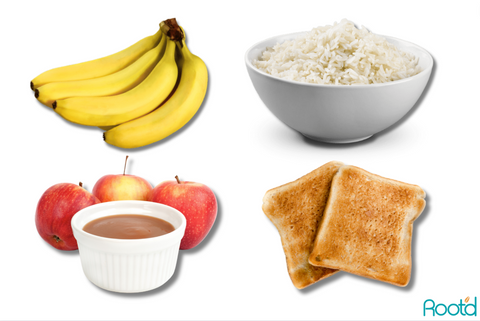
The BRAT diet has long been recommended for easing digestive issues. These bland and easily digestible foods can help settle your stomach without causing further discomfort. Bananas provide potassium, rice offers carbohydrates for energy, applesauce soothes the stomach, and toast provides some gentle fiber.
2. Ginger

Ginger has been used as a natural remedy for nausea for centuries (Yep, that long!). Whether in the form of ginger tea, ginger ale, ginger candies, or grated ginger added to meals, this incredible root can help alleviate symptoms of morning sickness. Its anti-inflammatory properties may also aid in reducing inflammation in the digestive system.
3. Smoothies

Smoothies are an excellent way to pack in essential nutrients while being gentle on your stomach after vomiting during pregnancy. Choose mild-flavored fruits like bananas or berries, and add some spinach or kale for an extra nutrient boost. You can also include yogurt or nut butter for added protein.
4. Crackers

Bland crackers like saltines are often recommended as an easy snack to help fight nausea during pregnancy. Eating a few crackers before getting out of bed in the morning can help stave off early morning nausea.The blandness of these crackers helps them settle in your stomach quickly without causing too much discomfort—perfect if you’re feeling particularly queasy! You can enjoy them plain or top them with peanut butter or cheese for extra flavor and nutrition.
5. Yogurt
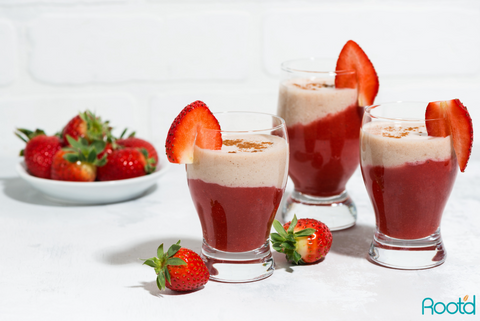
Yogurt is another gentle food option that can help settle your stomach after vomiting. It's a good source of probiotics, which promote a healthy gut and can potentially ease digestive discomfort. Opt for plain or lightly flavored yogurt without added sugars or artificial ingredients. The calcium and protein content is gentle on the stomach, especially if you're feeling nauseous. Opt for plain, unsweetened, or low-sugar varieties to ensure it's as bland as possible.
6. Cereals
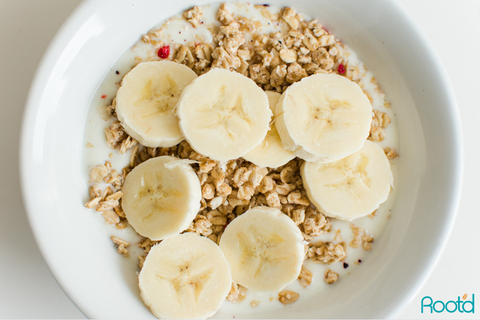
Whole grain cereals can provide a good dose of fiber, which aids digestion. Pairing it with milk (whether dairy or plant-based) can add a touch of protein and calcium. If you're feeling up for it, adding a few slices of banana or a handful of berries can also enhance the nutritional value and flavor.
7.Fruits and Fruit Juices
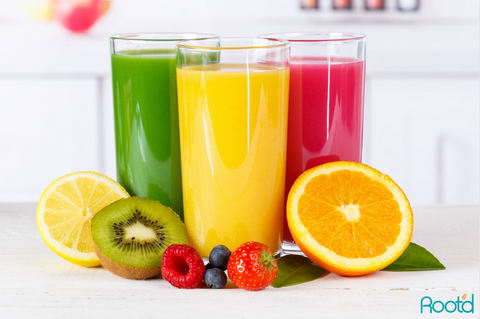
Fruits are a great way to stay hydrated and can also provide nutrients that are essential for a healthy pregnancy. Try snacking on juicy fruits like oranges, apples, kiwis, or pears. Or make yourself a smoothie with yogurt, honey, banana, and some frozen berries blended together. If you’re looking for something more substantial than just fruit alone, try adding a packet of Root'd prenatal powder to your smoothie for an added boost. You can also sip on freshly-squeezed juices or fruit-infused waters if you’re feeling particularly nauseous.
8. Ice Chips and Popsicles

Cold foods such ice chips and popsicles can be a soothing remedy for nausea and vomiting during pregnancy. They help in gradual rehydration without overwhelming the stomach. Additionally, chewing on ice chips can be particularly helpful if you're experiencing the common metallic taste in your mouth during pregnancy. The cold sensation can help neutralize and mask that taste, providing some relief.
Opt for popsicles made from natural fruit juices without added sugars for a refreshing treat. If you're feeling creative, homemade popsicles using your favorite fruit juices or even ginger-infused water can help cool you down, especially if you're feeling hot or flush
9. Vitamin B6
Taking vitamin B6 supplements may also be beneficial as it has been shown to reduce the severity of morning sickness in some women (though talk with your doctor before starting any new supplement). Vitamin B6 helps regulate blood sugar levels which may help reduce feelings of nausea associated with low blood sugar levels. Additionally, it helps break down proteins in our bodies which can help reduce acid pains in the stomach caused by digestion issues related to morning sickness. One warning with B6, though - it will make your pee yellow. Very yellow. Like wow, that’s really yellow! 🫣
10. Root'd Prenatal Multivitamins

If you're not a fan of taking multiple individual supplements, consider opting for a full-spectrum prenatal multi like Root'd. Root'd is specifically formulated to provide all the essential nutrients needed during pregnancy, including vitamin B6 and vital electrolytes for hydration. Its powder form eliminates the hassle of pill swallowing and can be a lifesaver for expectant mothers who may struggle with pill fatigue or experience gag reflexes.
Side Note - Want a 15% discount on your first order of Root’d prenatal? Use code YELLOW15 @rootd.com for 15% off, and if you don’t LOVE your Root’d, it’s on us!
Bonus Tips to Manage Nausea and Vomiting During Pregnancy
Eat Small, Frequent Meals: Instead of three large meals, try to eat small portions every two to three hours to prevent your stomach from becoming too empty or too full. Eat every 2 to 3 hours (small meal or snack) to keep food in your stomach. An empty stomach can make your nausea worse.
Eat Bland Foods: Foods that are bland and low in fat, such as toast, rice, and crackers, can be easier on the stomach. Avoid acidic, spicy, greasy, and fatty foods.
Avoid Other Triggers: If you notice that specific foods, smells, or activities exacerbate your nausea, try to avoid them.
Stay Upright After Eating: Lying down right after eating may worsen nausea. Give your food some time to settle before reclining. Keep your body at least semi-upright for at least 30 minutes after a meal. This helps the food stay down.
Listen to your body. Remember, while these foods and remedies can be beneficial for easing nausea and vomiting during pregnancy, always pay attention to how your body reacts and consult your healthcare provider for personalized recommendations.
When to Seek Medical Attention
For some pregnant women, morning sickness can progress into a more severe condition known as hyperemesis gravidarum. If you experience persistent vomiting accompanied by weight loss and dehydration, seeking medical attention is crucial. To manage this condition, your healthcare provider may recommend additional interventions, such as intravenous (IV) fluids to combat dehydration and medications to control nausea and vomiting.
Takeaway
Navigating the challenges of nausea and vomiting during pregnancy can be overwhelming at times. But, by prioritizing hydration and incorporating nourishing foods into your diet, you can help alleviate these discomforts while ensuring you and your baby receive essential nutrients. Remember to consult with your healthcare provider for personalized advice and support throughout your pregnancy journey or if you have any concerns about your nutritional needs.
Stay strong, momma, you've got this!💪








































Leave a comment